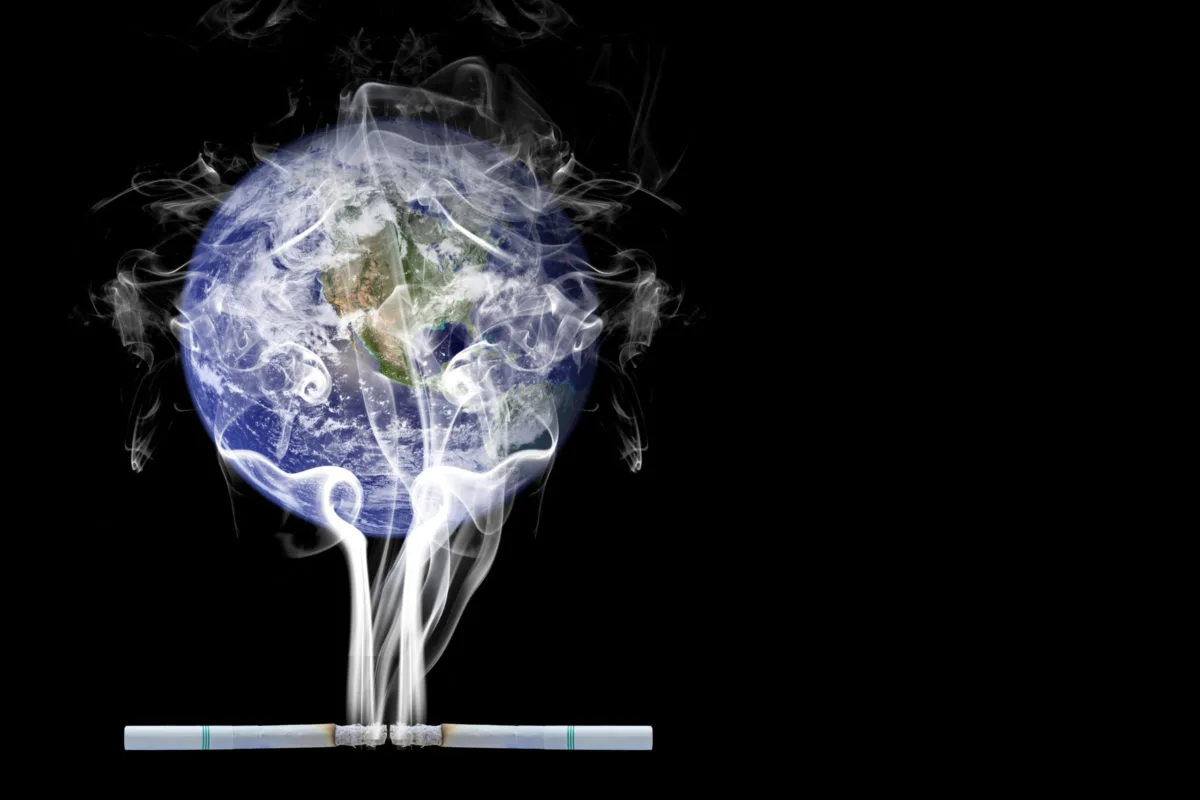- Resources
- News
-
-
Get Email Updates
Sign up for STOP's emails and never miss an update on our latest work and the tobacco industry's activity.
-
Share a Tip
Do you have information on tobacco industry misconduct in your country? Let us know.
-
Get Funding
Ready to tackle industry interference? You could be eligible for a grant.
-
Get Email Updates
Environment
April 30, 2020

It’s no secret that the tobacco industry has a tarnished reputation. With tobacco use causing more than 8 million deaths per year, defending its destructive impact on public health is a lost cause. That’s why tobacco companies are constantly searching for other ways to boost their public image.
Enter: greenwashing. It’s the tactic used by controversial industries around the world to represent their environmentally destructive products and business practices as sustainable. Deforestation, heavy chemical use in tobacco crops and the large amount of waste produced during manufacturing are just a few of the destructive practices tobacco companies want to hide. Tobacco industry greenwashing took off in the early 2000s and has been exploiting public concern for sustainability ever since. All the while, they continue—and profit from—environmentally damaging practices.
STOP researchers recently published new findings on exactly how tobacco companies are deceiving consumers and governments alike. Across the industry, researchers saw these common tactics in use.
Tobacco companies use “corporate social responsibility” (CSR) and lack of international environmental regulations to tighten their grip on low- and middle-income countries.
When developing economies cannot fully fund their own reforestation or environmental disaster responses, tobacco companies step in and offer money. When governments accept these donations, the industry can claim credit and build influence.
CSR activities also provide coveted access to governments. BAT Bangladesh used sustainability CSR projects to partner with the country’s Department for Agricultural Extension. This involvement contributes to Bangladesh’s already high level of tobacco industry influence in the government and paves the way for continued policy interference.
In another case, Imperial Tobacco (now Imperial Brands) provided majority funding for a sustainability NGO’s project for the Government of Mozambique from 2009 to 2014. In a country where the Gross National Income in 2016 was 3,116% smaller than the combined revenues of the six largest tobacco companies, the industry’s outsized financial sway means sustainability projects are an affordable access point to the government.
This access is the tobacco industry’s ultimate goal, as gaining access to policymakers allows the industry to influence health and tobacco control policies in their own financial favor, at the expense of the public’s health and wellbeing.
Lack of international environmental standards lets powerful tobacco companies pit low- and middle-income countries against one another. When a country proposes environmental legislation, tobacco companies are able to shut down their operations and re-open in other countries where rules are more relaxed, allowing them to continue their unsustainable practices. We saw this in 2013, when, upon facing potential air pollution legislation, BAT closed a plant in Uganda and relocated to Kenya.
Tobacco companies use recognition from sustainability groups to obtain legitimacy.
When tobacco companies can represent themselves, on any front, as trustworthy and socially responsible, they move one step closer to a seat at the policymaking table where they can advocate for preferential policies. Even though industry interference in tobacco control and health policy is prohibited per the Framework Convention on Tobacco Control, companies have been known to seek loopholes that allow them to work with governments and policymakers. Sustainability initiatives offer them the perfect opportunity to do that.
Each of the four major transnational tobacco companies (British American Tobacco, Philip Morris International, Japan Tobacco International and Imperial Brands) tout their recognition from sustainability groups like the Carbon Disclosure Project (CDP). Yet, when the same group gives them a poor assessment, these companies withdraw their participation. For example, when BAT, JTI and Imperial all received poor ratings on disclosure and impact in 2017, all three opted out of CDP Forestry reporting.
Tobacco companies write their own rules for reporting and goal-setting.
With no standardized disclosure requirements or reporting formats, tobacco companies are free to share only the sustainability data that paints them in a positive light—and hide the rest. Companies disclose different metrics from one another and even create their own units of measurement, making it nearly impossible to track progress or compare companies.
The industry is also free to set its own sustainability goals. When a goal isn’t met, a company can simply choose not to report it, and even drop it from reporting moving forward. After BAT for chemicals-used-per-hectare, it wasn’t held accountable. Instead, it announced it “would no longer have a global average target,” and stopped reporting on the measure.
Learn more
Extensive research on tobacco industry greenwashing is available on Tobacco Tactics—our newly revamped online resource that exposes and explains tobacco industry behavior—alongside actions governments can take to protect its policies and citizens from the industry’s ulterior motives. Just as advocates, researchers, governments and the public called tobacco companies out on the undeniable health harms of their products, it’s time to do the same with respect to the industry’s devastating impact on the environment.
It’s time to change the rules and hold the industry accountable.


